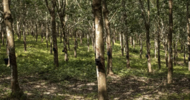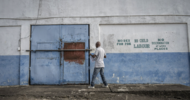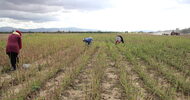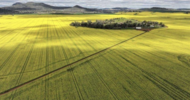The ailing Rift Valley Railway (RVR) concession is just an entry point to East Africa for Citadel Capital. Rachel Keeler speaks to the company’s Managing Director Karim Sadek.
Citadel Capital’s stormy entrance to East Africa culminated this week with the official announcement that the Egyptian private equity firm has acquired a 49% stake in Sheltam, the largest shareholder in the embattled Rift Valley Railways (RVR) concession. Rumors have been swirling since January about a faceoff between Citadel and the powerful Kenyan private equity firm TransCentury, which holds a 20% stake in RVR. Citadel has made it clear that it ultimately hopes to buyout Sheltam and take substantial control of the rail.
After a few weeks of wrangling and despite intense lobbying by TransCentury, it looks like Citadel might just get its way. And the firm says just as soon as it can get the RVR mess under wraps, it will move forward on plans to sink between USD200m and USD400m in East Africa by 2012. But the grand entry has stirred up plenty of questions: What exactly are Citadel’s motives and interests in East Africa? And what are the chances that this big brother from the north, for all its cash and bravado, can achieve success?
Up the Nile
First laid by the British a century ago, the RVR track connects the Mombasa port at Kenya’s coast to Uganda’s inland capital city, Kampala. It would be one of East Africa’s most useful transport links - if it functioned. But the rail has suffered decades of mismanagement and underinvestment. In 2005, the Kenyan and Ugandan governments awarded an operational concession to a consortium of private investors in an effort to get the trains back up and running. Sadly, a lack of coordination, capacity and finance has prevented much progress. This has been especially irksome to landlocked Uganda: President Yoweri Museveni is keen to see his rail connection to the coast improved quickly. High transport costs have long been a concern for Uganda’s exporters and its consumers, but the railway may also be the best way to get cash returns from oil production flowing in the short term. The Ugandan government has been at odds with its principal oil exploration firm, Tullow Oil, about whether to build a large local refinery or ship most of the oil out for export. But either way, a refinery would take at least five years to build. And the waxy quality of Lake Albert’s crude makes a pipeline option difficult, as does the USD2bn price tag. Trucking out 150,000 barrels a day – Tullow’s production target within the next three years – is simply unfeasible. So then there’s the rail, suddenly looking more important than ever. Citadel Managing Director Karim Sadek says that for Uganda, “it is irrelevant who controls the railway, as long as that entity controls a functioning railway.” It was Uganda that supported bringing Citadel and its USD150m on board to whip RVR into shape. For Citadel, the investment makes a lot of sense. The firm has a history of investment in transport and logistics coming straight up the Nile from Cairo to Khartoum and now into southern Sudan and Uganda. And Citadel likes to chase assets that can capture large markets: river barges, ports, power grids, and railways. Nothing too avant-garde like real estate or IT. “Most of what’s driving us,” Sadek says, “is the recognition that if you deal with basics, you have a bigger market.” If Citadel controls RVR, it can capture growing markets in the eastern DRC, Southern Sudan and the East African Community (EAC) of Rwanda, Burundi, Uganda, Kenya and Tanzania – far over a hundred million consumers in one go. The rail could also serve as a lynchpin for Citadel to drive regional investments in agribusiness. Other private equity players here say sure, RVR is a great investment – if you can make it work. But the concession itself remains mired in complexities. And Citadel must find a way to diffuse the animosity it has inspired amongst its Kenyan partners. Still, the firm seems undeterred. Sadek simply says casually, “We do difficult things.” Sudan, North and SouthCitadel has already proven its appetite for risk and adventure south of the Sahara. It started a few years ago with a USD20m investment in a bank. Now Citadel has investments worth USD800m spread across north and south Sudan. The more daring ventures include rights to 250,000 feddans of land for food production in south Sudan’s Unity State. With a referendum coming up next year that could render the south independent, Citadel also hints at an interest in building some of the infrastructure it would take to make the war-torn region a viable nation. “The usual suspects for state financing are in the West,” Sadek says. “But will the West in today’s post-global crisis environment support building a state from scratch?”
Sadek is frank about the risks. “We are definitely worried about 2011,” he says. The referendum itself will likely incite violence, and more trouble could come from inter-tribal disputes once the south’s common enemy is somewhat removed. This poses a “huge risk” that has forced Citadel to minimize the percentage of its portfolio dedicated to south Sudan. Another “major hurdle” is the lack of transport into and out of the region. Citadel has invested in river shipping along the Nile, but there are limitations to this. It is entirely unclear when or if a new railway and port will be built to connect south Sudan to the Kenyan coast at Lamu. Land security could also become a problem. Sadek says Citadel has made a deal with the local state government and tribal leaders. Still, land tenure in the south’s shifting environment is notorious for being anything but certain.
Ambitious East Africa Plans
Investing in the EAC presents fewer hurdles. But RVR has not been easy. The deal is taking much longer than expected to nail down and has diverted attention from other opportunities. Citadel’s TAQA Arabia controls 40% of the market for natural gas distribution in Egypt and hopes to translate this experience to working on Tanzania’s nascent gas industry. However, Sadek says he has yet to find the time to look at the myriad regulatory and political risks involved in the sector. It’s the same with geothermal production in Kenya, oil in Uganda, and agribusiness and microfinance and waste management potential across the region. Also slowing things down for upstream oil and gas and waste management is that the firm has most of its capacity tied up in other projects. Citadel has a fairly unique structure as part private equity fund, part investment company. It doles out cash through 18 opportunity specific funds that each control a sector-specific platform company that in turn makes acquisitions and oversees a portfolio of investments. This makes Citadel more flexible than many other funds operating in Africa. But the only new platform that has been created so far for investments in East Africa is the one pursuing RVR, “Africa Railways”. Several of the other existing platforms will need to clear their slates a bit before shifting resources into the region. Sadek hopes to move into natural gas in Tanzania the second half of this year. Citadel is already actively pursuing agribusiness investments in Ethiopia through its platform company Gozour. Gozour announced this month that it wants to start contract farming raw materials for use in its food processing factories in Egypt and distribution to Egyptian and eastern African markets. Gozuor says it may set up processing plants in Ethiopia in the future. But the current focus seems to be on sourcing raw commodities, for which Gozuor is also eying Uganda and Kenya. This could drag Citadel into a few more sticky areas: Acquiring large plots of land for farming anywhere in East Africa will be difficult given the region’s dysfunctional land legislation and volatile feelings on the topic. Attempting to ship any food off to far-flung destinations may also rouse trouble. Recent attempts by a number of foreign investors to farm for export in Africa have triggered strident allegations of neo-colonial land grabbing. Sadek dismisses this as an “academic concern”, saying “there should definitely be a priority for that produce to be sold on the local market, if there is a paying market for it”, and that ultimately these are decisions for the government to make. But local opposition in Kenya – where millions of people are starving – has already derailed a deal struck by the government to grant farmland in the Tana River Valley to Qatar. We’re not exactly EuropeansThen there are the soft issues: culture, connections and perceptions. Last November, Citadel co-hosted the African Venture Capital Association’s annual conference in Cairo as part of an effort to rebrand itself as no longer a strictly Middle East and North Africa (MENA) firm, but one with pan-African credentials. Every press release that goes out now refers to Citadel as the “largest private equity firm in Africa”. Sadek is on his way to Nairobi the end of February to look at setting up an office here. He likes to repeat the refrain of how surprised he’s been at how East Africans view Egypt in separate cultural and economic terms: “Our experience is not any different than what we’re seeing in East Africa,” he says, citing poverty and huge public debt. “The Kenyan population is the same number as the people living on less than two dollars a day in Egypt.”
Kenya is just like Egypt was in the 1990s, Sadek posits: Old Egyptian families then acted much like TransCentury does now, considering the ownership of a thing more important than its value. But those business families finally realised that “the value of cash is much bigger than the value of assets”. The idea being: give it enough time, toss enough money in, and people will come around. Egyptians are experienced in this and plenty of other messy things. “Nothing that we’ve seen so far in this region comes as a surprise to us,” Sadek says. “We’re not exactly Europeans.”
Perspectives
But Citadel is largely still seen as a slick North African player, untested although not necessarily unwelcome in these southern locales. Observers say acceptance and ultimate success will depend on what Citadel does on the ground. Can the firm get RVR back on track? Will it actually deploy the promised USD400m in East Africa, and in what ways? Will money go to strengthening and expanding local companies, or be funneled back into Egyptian pursuits? Tuninvest, another North African private equity firm, has managed to successfully reposition itself as a pan-African fund by cultivating connections throughout the continent. Increasing attention from big MENA investors is welcome as a way to inject much-needed capital and project development expertise into growing sub-Saharan markets. Other infrastructure investors say they welcome the healthy competition and potential for partnerships. Big projects like the Turkana Wind farm in Kenya require funding from a variety of sources to go forward, and opportunities for deals of this size are sure to increase with further EAC integration. Citadel is also exposing its private investors to money-making potential outside the MENA region. These big spenders have already come in at the holding level for opportunity specific funds, which are now diversifying into eastern Africa. Citadel expects to see similar rates of return, possibly even higher to account for increased risk. And the firm is working with the International Finance Corporation (IFC) and the African Development Bank (AFDB) to raise a USD150m standing co-investment fund for Africa. For every USD1 that Citadel spends on certain deals, the fund will match it with USD2. More outside interest, cash, and investor cooperation will help spur already strong growth in eastern Africa. But whether Citadel will succeed in smoothing over rivalries and cementing itself as a truly African investor remains to be seen.













